MindReading
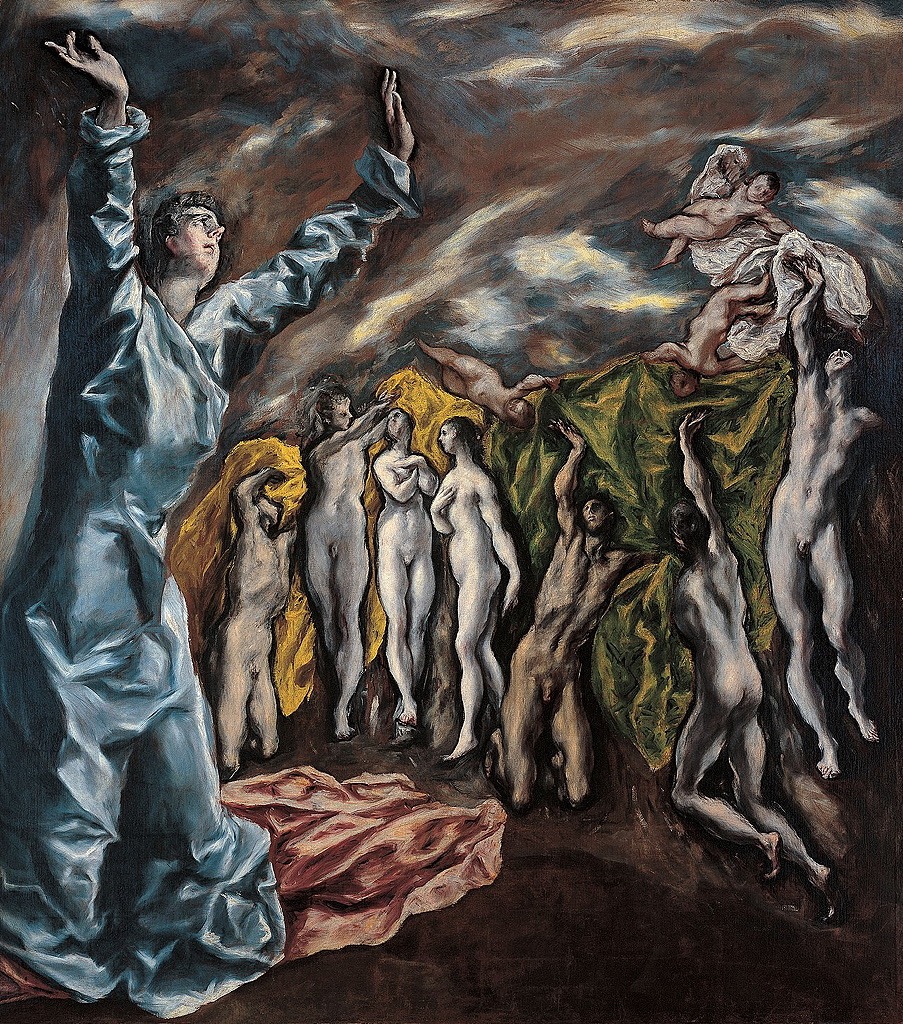
El Greco: The Opening of the Fifth Seal, The Vision of Saint John (1608–1614)
" … the source of endless unwanted entertainment."
I've learned that The Villa has eccentric windows, homemade double hungs with cords and weights dangling in the walls. They have proven themselves mysterious in almost my every encounter with them. They are not of standard design, but apparently Homemade. I've learned most of their tricks, but they still prove capable of confusing and confounding me. Earlier this week, I noticed an original pane in the lower frame of the big four foot wide window in front of my desk, the very window I usually look out through when writing, had somehow developed a crack. Kurt Our Painter and I quickly removed the stop holding the frame in place and i removed the cords. I took the frame to the glass shop for a pane replacement, retrieving it the next morning. By the end of the day yesterday, I'd finished repainting the frame and Kurt and I set about setting it back into the window, usually a trivial chore.
It didn't fit.
SalesPitch
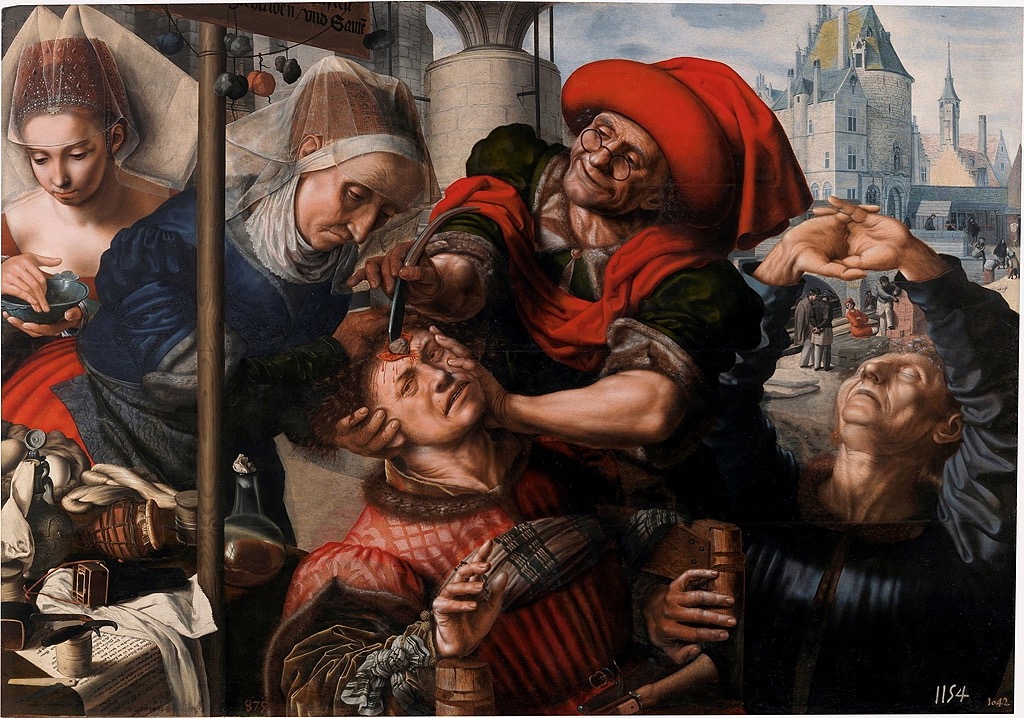
Jan Sanders van Hemessen: The Extraction of the Stone of Madness (c. 1550)
"I'm intrigued by any sales pitch which focuses upon all I will not get if I choose them for a relationship."
Those of us who create Homemade stuff, which I guess includes pretty much all of us, maintain relationships with our reliable suppliers, and we swear by the ones we adopt. My mom might have contended that "everything comes out of the same spigot before they put different labels on it," but I firmly believe (by which I mean I believe merely as a matter of conviction) that I use the absolutely best available brand of paint, for instance. I feel secretly shocked when I learn of someone favoring a different supplier, for I see that choice as clear evidence of their poor judgement. I might not attempt to convince them of their error, but only because I understand that nobody's likely to ever convince me that I have not discerned the very best paint supplier in the world, I have considerable treasure and effort invested in that choice. Others probably do in their's, too.
I've been visiting my paint store several times each week as we've worked through this Grand Refurbishing
OnMyKnees
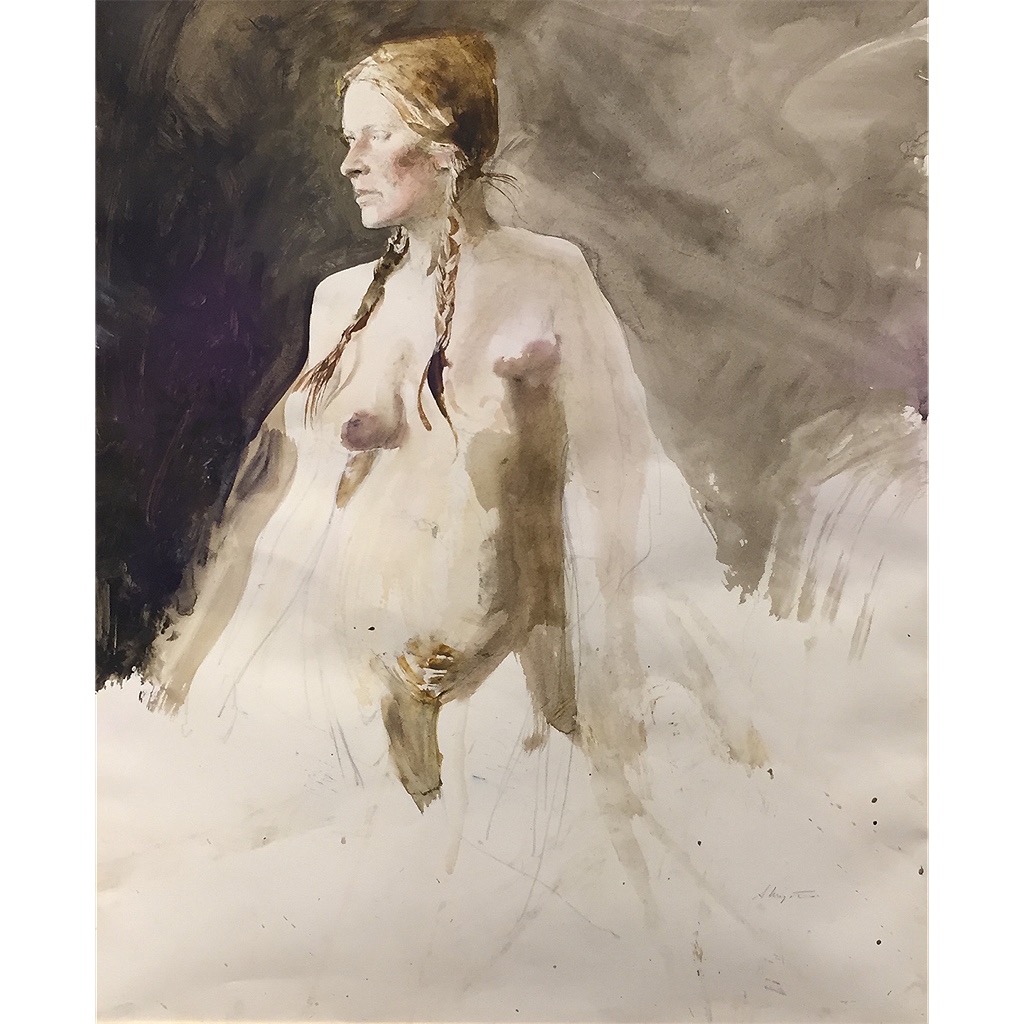
Andrew Wyeth: On Her Knees, Helga (1975)
"Self reliance has little to do with standing on one's two feet …"
Almost everything used to be Homemade. Now, only exceptions are. The transition, largely accomplished over the last century and a half, proved traumatic as well as transformative. Our GrandOther wants nothing to do with learning how to sew, for instance, once considered an essential skill. The Muse dedicates a whole room as her sewing room and even fabricated a tailor's dummy of her own body to enable her to design her own patterns and better fit her creations. Almost nobody does that anymore.
I spent yesterday afternoon on my knees sanding the margins of our grand staircase.
Crapsmanship
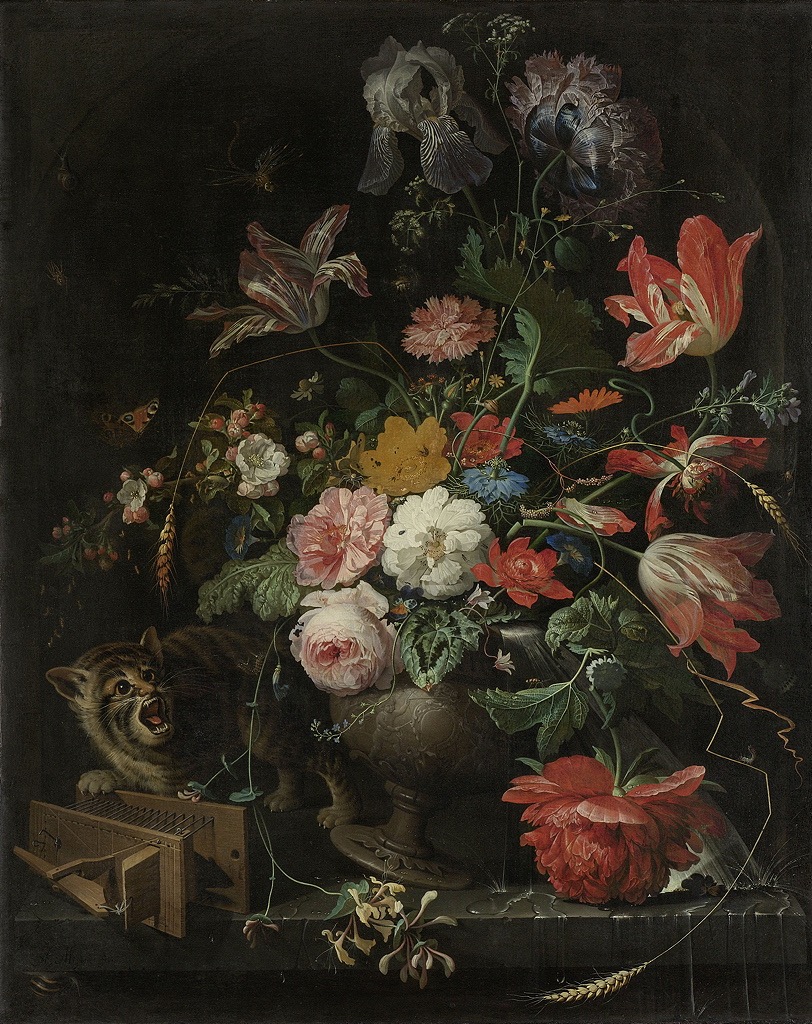
Abraham Mignon: The Overturned Bouquet (1660-79) -
This work is widely regarded as a truly terrible painting.
"That I can even discern the difference … suggests that I've already come far."
Removing master bedroom baseboards, I came upon one which almost defied removal. It was an odd section. While the other walls featured long single boards, this one was a short extension for a longer one. This wall's base had been broken into two sections. The Muse later noticed the outline of a prehistoric doorway just above this section, an entry into what we've imagined might have been a screened sleeping porch back before internal bathrooms were necessary. The board had been secured with four very large headed nails while the rest of the baseboard had been more properly anchored in with countersunk finishing nails. I had to destroy that board to remove it. It needed refabricating, anyway. I'd encountered a bit of shoddy workmanship again. Not my first encounter and probably not my last on this refurbishing effort. I thought back to an earlier story about our Colorado place which I titled Crapmanship and reminded myself that Crapsmanship is universal. Every house features some of it, regardless of how able a craftsman owned it then or now.
Not every fix measures up to the highest standards, and it probably makes sense that the shoddier work will need reattending to soonest.
Plumps
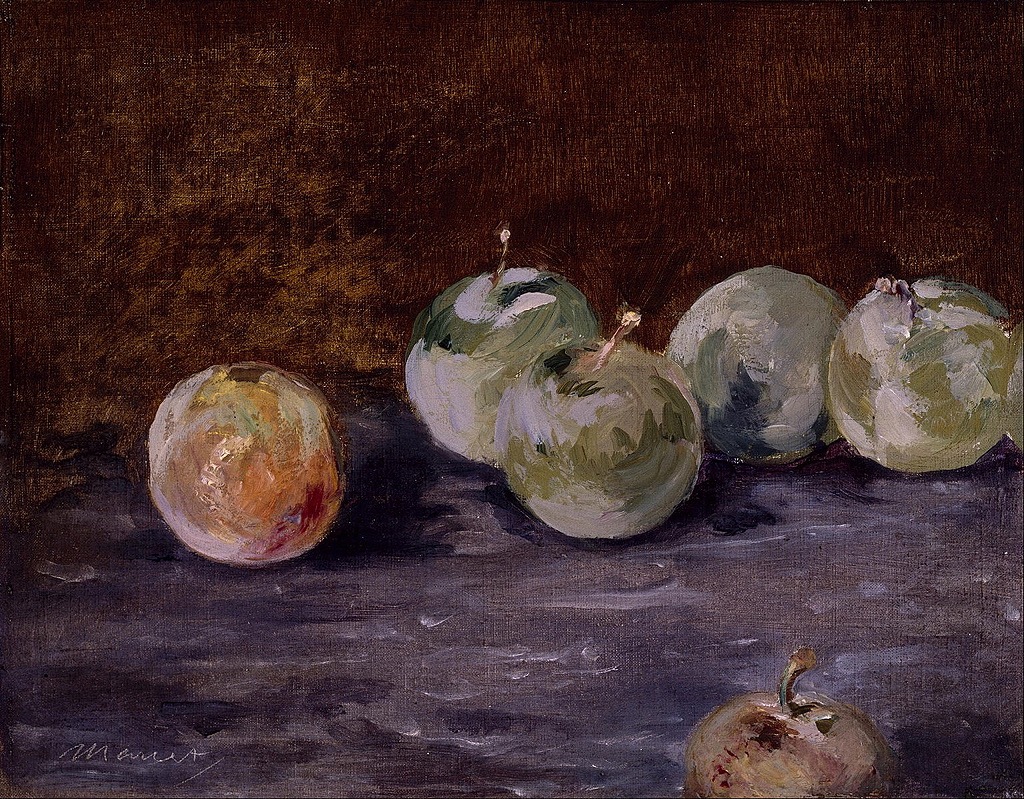
Edouard Manet: Plums (circa 1875-1885)
"[We] count ourselves wealthy and fortunate, and plump …"
When The Muse's son was small, he called plums "Plumps," in a typical childhood misunderstanding, a false cognate accomplished using only one language. My daughter referred to discussions as "disgustings" in a similar and similarly accurate misunderstanding. Plums are plump and might have been better named plumps from the outset. Of course, they are called plumps around The Villa and forever will be. Every home breeds its own dialect featuring words and interpretations unique to the people there, a Family Language. In the early Fall, The Muse's thoughts turn toward Plumps. She buys volumes of them fresh, even though most of the dried plumps from last year are still here with us, reposing in the basement larder.
The sole use for plumps in this house has been in dressing with which to stuff the Christmas goose.
Deceiving

Pere Borrell del Caso: Escaping Criticism (1874)
"I hardly ever catch myself Deceiving myself anymore …"
Deceiving might be the primary skill underlying every Homemade everything. Nobody starts off competent to make very much of anything at home or elsewhere, and considerable experience might well be required to get any better at making something fit. Criticism seems the very last thing any budding maker needs. Each rather needs the opposite of that. To accomplish this, Deceiving will be required, with self deception heading the list of those targeted with this gift, but it's wise to stay out of eyeshot of well-intended neighbors and the highly skilled, for they can never do any budding maker any good and often inadvertently inflict wounds grievous enough to convince anyone not to continue attempting. Competence requires considerable attempting, best done some distance from criticism.
One learns from their mistakes but not if they cannot escape them.
LastOne

Paul Gauguin: Vision after the Sermon (1888)
" … after gaining all the experience of fixing its eleven brothers."
The first one tends to be difficult for me to complete. I'm not even learning yet. I'm at best orienting myself, but I might be more accurately described as misleading myself, for I've gone off half cocked, without really understanding either the context or the possible solutions. I'm very likely a little frustrated and just attempting to dispatch this distraction, not yet having noticed a certain pattern to both this problem and to my default solution. The second one's usually much better. In terms of net improvement one over the other, the second probably represents the greatest improvement of the whole batch. Even if I do a dozen, no two will likely show as much improvement as the second from the first. The following ones will feature minor variations. That second one will likely prove to be a revelation representing the pattern for how I'll think that's done. I could still be wrong, but I'm feeling productive.
I know how to do very little and rely upon the stuff I fix to teach me how to fix them.
Homemade?
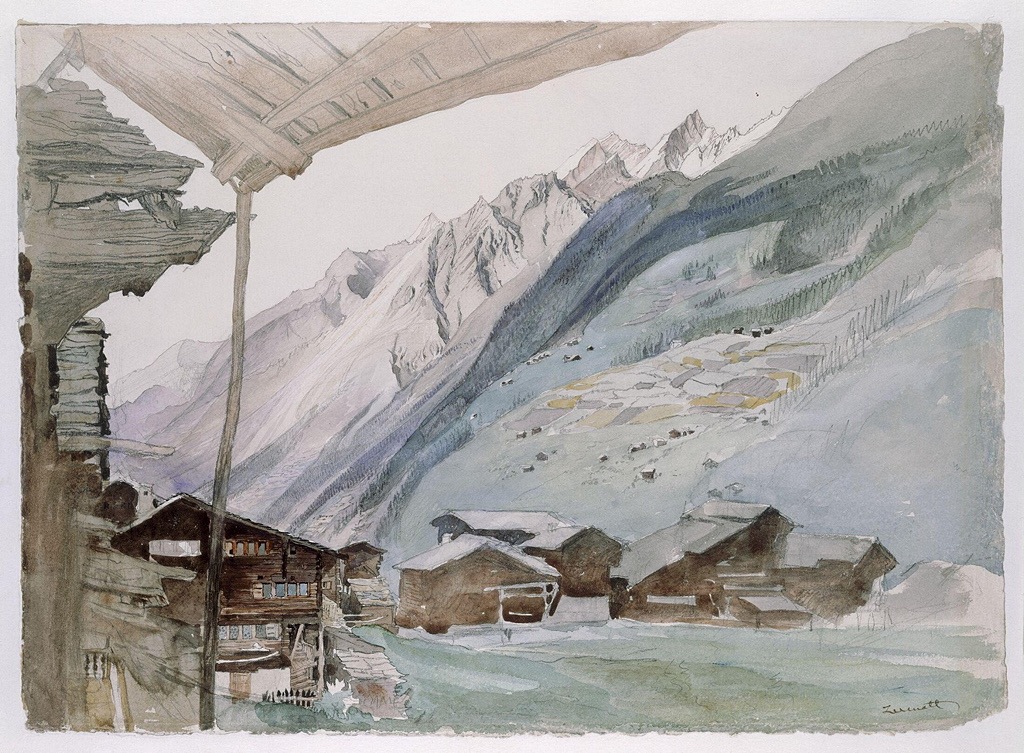
John Ruskin: Zermatt (1844)
"Done once, well enough, and never to be replicated."
By the end of each afternoon, my arms covered with a fine patina of sanding dust, I'm finished with my HomeMaking for the day and ready to make something for supper, something Homemade. As you already know if you've been following my stories, The Muse and I have been attempting to move into our home, The Villa Vatta Schmaltz, for six months, but have not yet managed to move completely in. We've been Refurbishing the place before setting deep roots, still living out of boxes and with dust, primitives as we attempt to elevate this house into our home again. There are no repeat performances. We once lived here, now we live here again. We are not back, but here, again for the very first time. This is our home now, though not yet fully finished. This is how Homemade works, wholes made out of somewhat unfinisheds.
Over the past three months, I wrote my daily stories under the heading of HomeMaking.
Headswarming
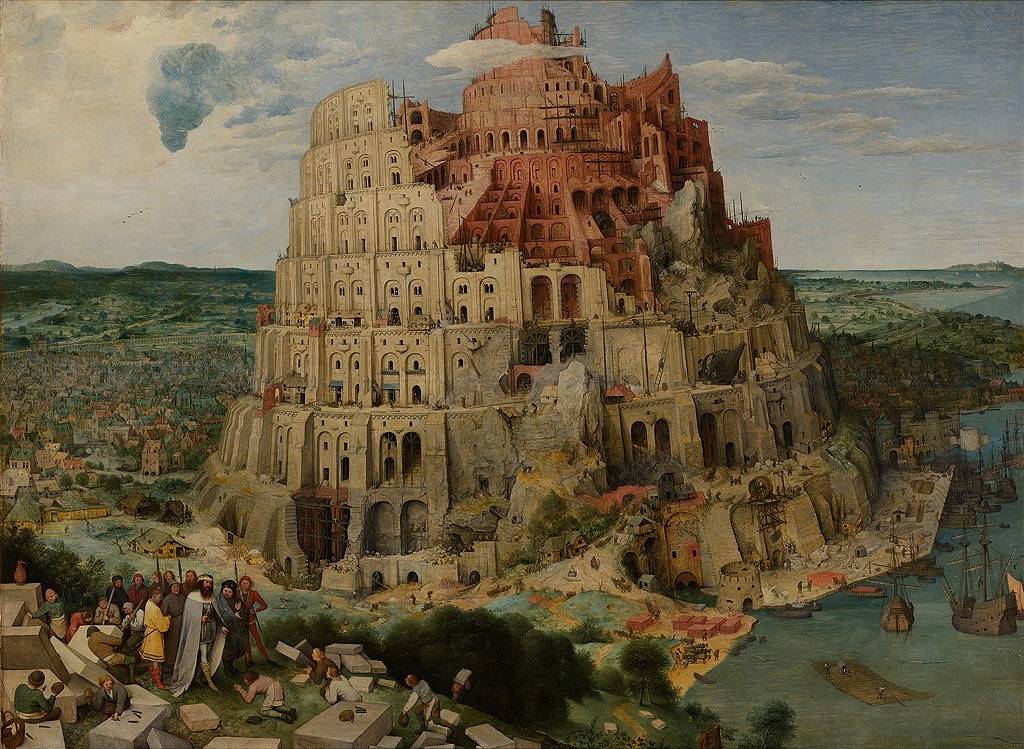
Pieter Bruegel the Elder: The Tower of Babel (1563)
"I already know what I want for Christmas."
When I was a kid, summertime featured plenty of boredom. As an adult, boredom's been more difficult to come by. As a budding HomeMaker, it's been essentially impossible to find. This summer, passing now into Fall, featured days filled to capacity with meaningful activity, perhaps the most dangerous possible condition for anyone aspiring to become an interesting or a creative person. I have lived this season in dread fear that I might become uninteresting after spending so many days refinishing doors. What could possibly be more boring than a man going on about the finer points of door refinishing? Any infinite work queue will do, though, to turn a decent fellow into a drudge. It's not the All Work and No Play Clause kicking in, but the lesser appreciated All Activity and No Boredom one. Boredom is probably an essential human experience. Those who fail to experience it seem doomed to an overly kinetic existence, a blur of a presence.
One must not only have leisure, but know how to use it.
LastFullDay
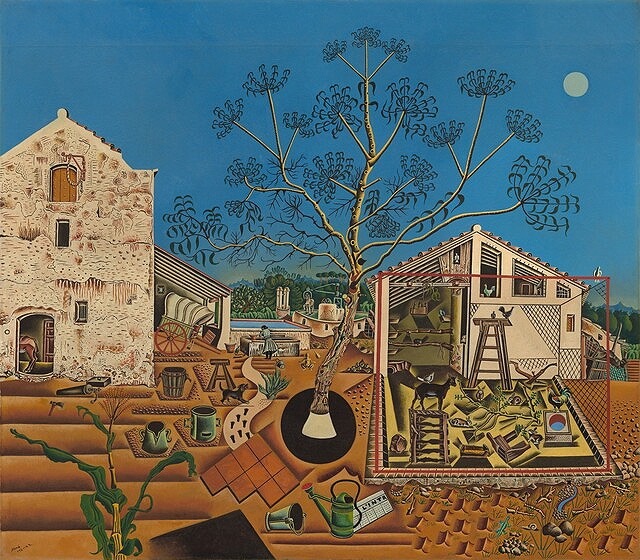
Joan Miró: The Farm (1921-1922)
"I never want to say goodbye …"
The end of anything tends to elicit a sense of loss, however much might have been gained from the departing experience. For me, endings introduce a beginning-over rather than a continuing-into sensation. Summer does not mature into Autumn, but falls down into it. The salad season where The Muse could and would mosey out to the overgrown tomato forest to bring back supper's salad seems to be ending with no adequate replacement. Tomatoes will soon taste of cardboard again and we will leave them lying in their false promises on produce aisle shelves. We'll resort to stews and braises and less frequently grill. I'm already noticing that the morning sun no longer blinds me at breakfast. Time has taken, over the last few weeks, to moving inexorably again, dragging me along unwillingly, insisting. And I've held full days as my final defense. As long as full days stood in the way of this latest inevitable, I felt safe. Today will be the LastFullDay and will leave me with only a flimsy half day of summer remaining tomorrow. I should expend this LastFullDay extremely carefully, though it will abandon me either way.
I experience what I've not accomplished more deeply than whatever I've achieved.
Hash

The building of the palace of Khavarnaq, from Nizami's Khamsah.
Painting attributed to the master-painter Bihzad. Herat, late 15th century
"HomeMaking might just be home."
Homemaking's iffy work. Always attempted 'on spec', it follows no fixed path. Largely driven by intentions, no guarantees accompany its effort. One scratches at the Earth without knowing beforehand what might sprout and grow from the effort. Each instance seems distinct enough to cloak expected results. Two months and change into our Grand Refurbishment, our home seems distinctly less homey than it did when we started our work. Of course our work's not yet completed and we do not know what percent complete we are today, as if that was saying anything. Percent Complete has always been one of those bullshit concepts which seem perfectly uncontroversial, yet it presumes as knowable innumerable aspects of a pursuit, rendering any response to the question, "What Percent Complete are you?" not worth the breath expended expressing it. Nobody ever knows. I do know for certain, though, that I've made a Hash of this HomeMaking so far. While some chance remains that we might one day finally realize the home we've so long aspired to own, it's probably more likely that we'll still be aspiring when we die, never having realized what we pursued with such earnestness.
Conservative columnist George Will concluded his Washington Post column this morning by saying, "For Americans, the pursuit of happiness is happiness.'
SecondSleep
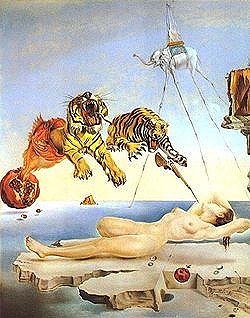
Salvador Dali:
Dream Caused by the Flight of a Bee around a Pomegranate a Second before Waking (1944)
"On weekends I dream my Second Sleep dreams with Max The Monster Cat kneading on my shoulder."
In centuries before industrialization and time regulation, when darkness and fire dominated every evening, people allocated their time differently than we do today. Then, most were, indeed, up with the chickens and down shortly after supper, but most maintained a second period of which they also made productive use. Most did not sleep twelve hours each night. They'd rouse in what we'd refer to as the middle of their night, get dressed, maybe snack or even go visiting neighbors. After two or three stolen hours, they'd tumble back into bed and catch a few last zzzzzzs before rising again with the chickens. They called that second snooze 'SecondSleep', and it's something we lost when we domesticated ourselves into nine-to-fives separated by commutes, when we abandoned the sun standard for time, and when we began staying up to watch the late news before bed.
That period between first and second sleep was more private than daytime wakefulness.
Tolls
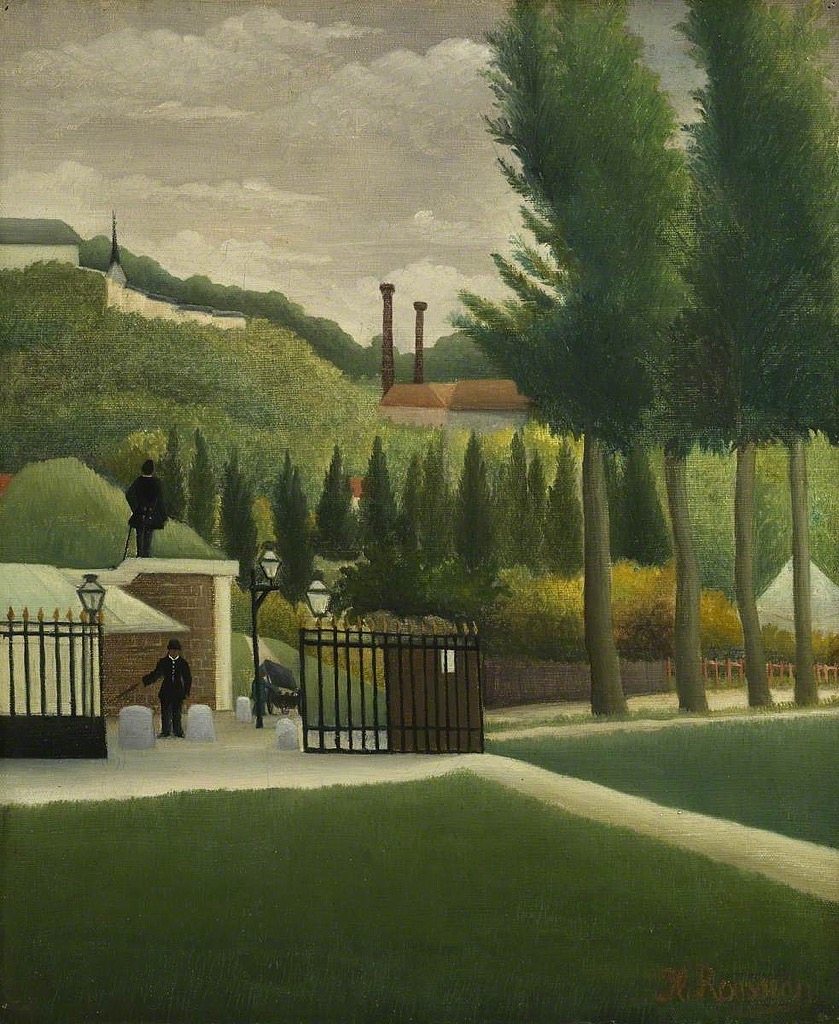
Henri Rousseau: Toll Gate (circa 1888-1892)
"The price of progress might not be my soul …"
If there's no such thing as a free lunch—and I'm not fully prepared to accept this premise—then it might follow that all human activity exacts some sort of toll or tax on the human engaging in it. Repetitive motion injuries have been widely recognized and humbly acknowledged. It seems as if half of the more common syndromes carry a professional designation: Coal Miner's Lung, Cyclist's Knee. The most dedicated come to wear their self-inflicted infirmity as a badge of honor designating their self discipline. The less fervent might use their wound as an excuse or a cautionary example, whining rather more than seems strictly proper or necessary. I, myself, maintain a growing list of physical complaints which seem to stem from our Grand Refurbishment work. Some hold no obvious connection, by which I mean that I cannot point to a specific event or action which resulted in the affliction, but each fresh wound appeared during the period in which I was engaged in Refurbishing work, so I classify it by association. I see them as a result of my engaging whether or not they actually were. I consider these damages as representing the Tolls of Refurbishing. I feel equally honored and embarrassed by their presence.
I noticed that my fingerprint no longer works as a security check when awakening my phone.
Woikin'
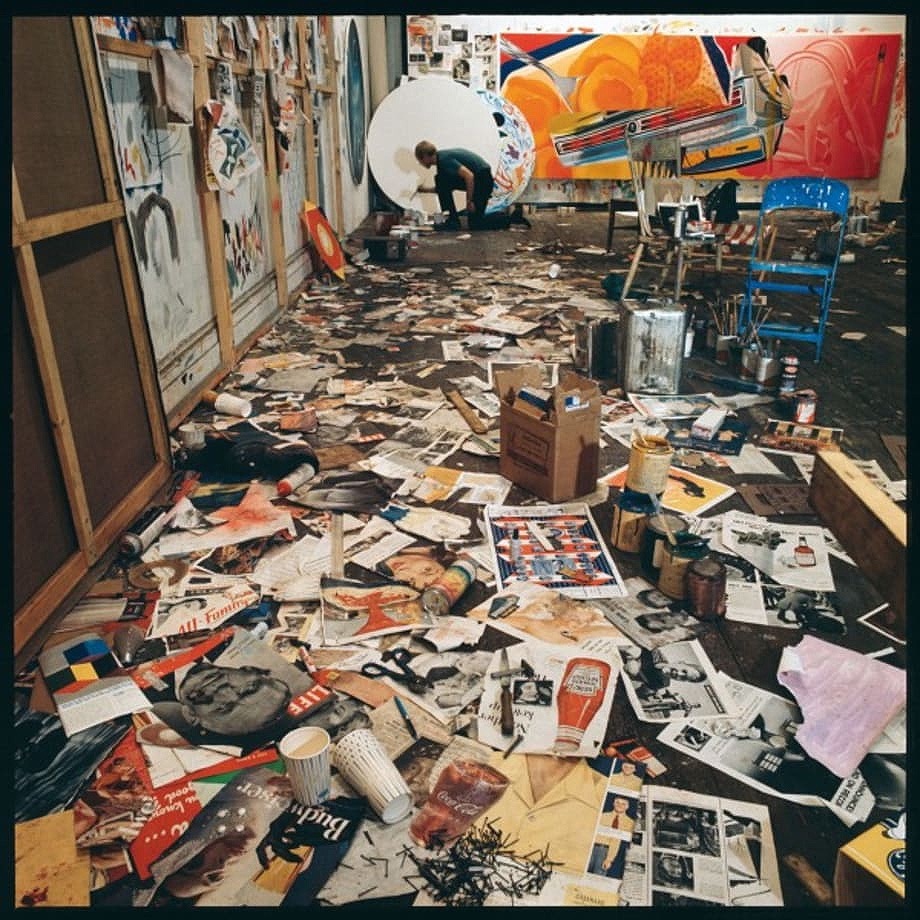
Ugo Mulas: James Rosenquist, New York (1964)
"I inhabit a perfect market featuring infinite supply and no demand."
I have been gainfully unemployed for so long that I no longer remember the sensation of 'having a job.' I have my work, of course. Who doesn't? But an actual job? I might have become functionally unemployable. I do not know why. It just seems that at some point, there was no demand for whatever I did. Nobody ever said anything about it. No dissatisfied customer ever protested my performance. I was just no longer working. Not retired. Not laid off. Not so much out of work, but more like employment abandoned me, leaving me to pursue my own work. When a form asks for my employer, I write in 'Self,' though I'm not actually my employer. My work employs me, but not because it pays me for my time. My work employs me because it holds my attention. Maybe next time I encounter that question on a form, I'll fill in 'my work' and see what happens.
I took a survey this week and encountered all of my questionnaire pet peeves.
Mindering

Paul Klee: Red Balloon [Roter Ballon] (1922)
"I've become my own DJ and audience."
When I'm painting, I can listen to an audio book, but painting's only a tiny portion of any painting project. Much more time goes to prepping, which tends to be noisy work, too noisy to allow listening to any audio input. Of course I could just finally cave in and buy a noise cancelling headset as I've threatened for years, but I'm learning to appreciate the selective availability of external entertainment and, much more importantly, I seem to be gaining a fresh appreciation for where my mind goes when denied distraction. I'll call that state Mindering. My mind wanders to the most curious places. A tune might dominate for a while, one selected from an impressive list, no justification given. Chattanooga Choo Choo accompanied me through two full Pop-Up Paint Shoppe days this week. I compose impressive essays while sanding door fronts. I relive scenes from my past and pre-live a few from my future. I engage in lengthy internal dialogues. My mind never stops chattering.
Those who engage in relatively menial activities seem to have the greatest opportunity to enjoy the joys of Mindering.
CodeTalkin'

Photograph by Edward S. Curtis: Cañon de Chelly, Arizona (ca. 1904)
" … probably won't ever come out and declare that he never did have a clue …"
During both WWI and WWII, the US Army signal corps employed speakers of Native American languages as so-called Code Talkers, for radio chatter conducted in their native tongues was absolutely untranslatable code for German, Italian, and Japanese code breakers. Code Talker transmissions were never compromised. Now, it seems each profession maintains a native dialect, the purpose of which might mirror the original Code Talkers', to transmit sensitive information without fear of translation. Painters, plumbers, carpenters, and carpet layers each employ certain distinct patterns of speech to cloak their underlying meaning. Good often means mediocre. Awful might mean excellent, but don't let that judgement go to your head. Our flooring supplier uses standard project weasel language which I recognize from decades hanging with Project People.
Project People maintain many deeply encoded language patterns which fall under the general category of Schedule Chicken.
MonkeyBars

William Holbrook Beard: For What Was I Created? (ca. 1886)
"Imagine how fortunate we feel …"
As the sun set last night, I called down into The Muse's Zoom® Lair to ask if she'd climbed up to the second floor yet. She hadn't. I implored her to get out there before she had to try it in the dark. She responded with the warmth of someone who'd been insulted by a suggestion. You see, we'd reached that point in our Grand Refurbishment when we could no longer just use the stairs to reach the second floor, where bedroom, full bathrooms, and showers reside. I'd erected scaffolding in anticipation of this time. Our Painter Kurt kindly donated his plank to the project. I used clamps and leftover trim wood to stabilize that plank between the flat front porch roof and the scaffolding, creating a pathway of sorts between the main floor-level front porch and the little door off the front porch roof deck into the second floor. It seemed plenty precarious so I'd practiced my ingress and egress a few times before the sun set, but The Muse hadn't. Yet.
She easily clambered up, puzzled at what my concern had been about.
Dooring
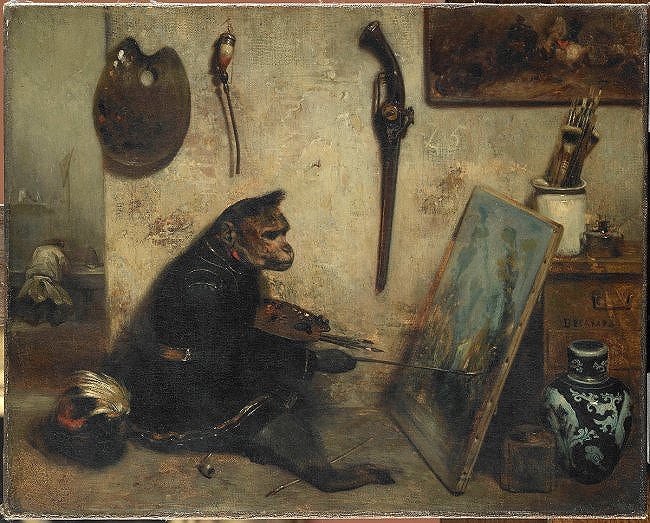
Alexandre-Gabriel Decamps:
Le singe peintre, aussi dit Intérieur d'atelier
[The Monkey Painter, also called Workshop Interior.] (ca. 1833)
" I will miss this work once I'm finished."
Six weeks ago, I posted what might now qualify as an introduction to the fine art of Dooring with a piece I called Doorable. In that story, I explained how I believe that the world is always trying to teach me and that I'm a reluctant learner. Kurt Our Painter and the doors themselves have been dutifully teaching me how to paint doors over the last month and a half. Nearing the end of this part of my contribution to our Refurbishing effort, I might have a few learnings to share. I'm not yet in any way an expert doorer, or whatever a door refurbisher might answer to, but I have finished, or, more properly, refinished, nineteen door fronts now, with only four remaining, and I've been noticing a certain facility emerging in my practice. I have a method of sorts in that I seem to be following more or less the same steps with each door front I face. I work much more quickly and decisively now, with few unforeseen discouraging events, which seemed common at first. I have my tools and techniques sorted, ready to hand. By the time I finish this work, I might never refurbish another door, for only five will remain unrefurbished in the whole place.
These doors have been teaching me.
'FraidSo
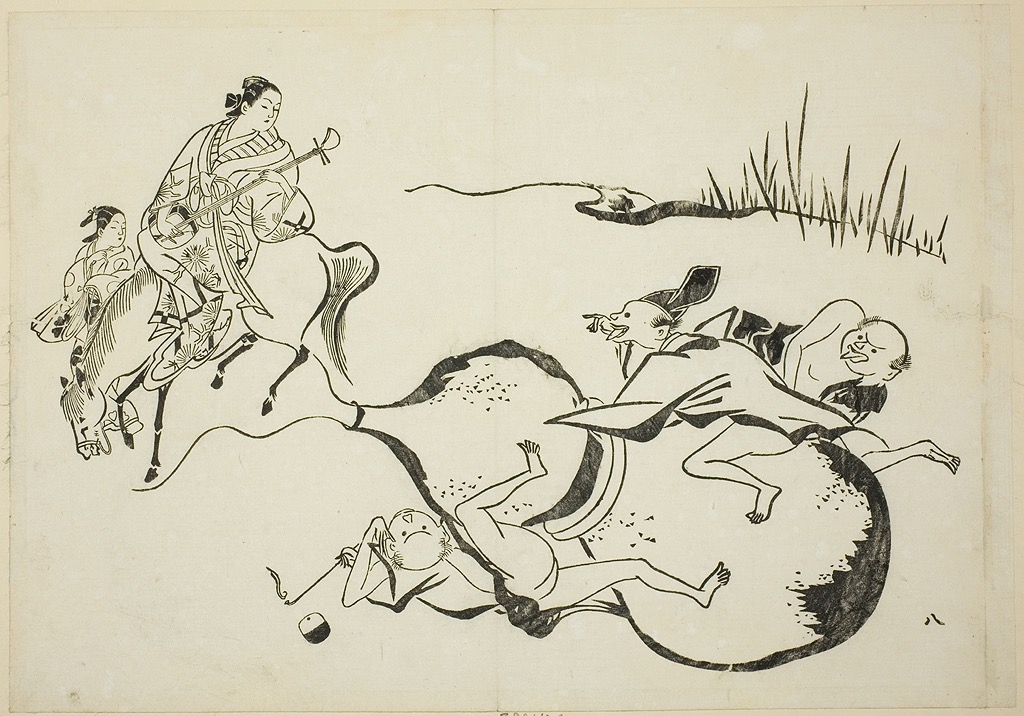
Okumura Masanobu: An Impossible Feat by Imaginary Men, no. 8 from a series of 12 prints (1708)
"If you meet a fearless being on the road, run for the hills in fear."
I find HomeMaking terrifying, which isn't really saying that much, since I find life generally terrifying, so it should naturally follow that I would find HomeMaking, being an integral part of my life, terrifying. I noticed again this morning as I walked along the upstairs hall, feeling my way through pre-dawn darkness, I heard myself whisper to myself, "I am afraid." It's not an uncommon comment for me to catch myself whispering, though I usually only intend this comment for my own ears. I no longer interpret this statement as an excuse to get out of doing something, for I usually feel my fear and choose to proceed anyway, a response I've grown to invoke, if only because it enables me to do things. If I avoided engaging in activities that terrified me, I'd be hiding in the basement, though basements, too, kinda fill me with dread.
Years ago, I stumbled upon a fine little book called Art and Fear (Art & Fear: Observations on the Perils (and Rewards) of Artmaking By: David Bayles; Ted Orland, 2001).
FirstRain
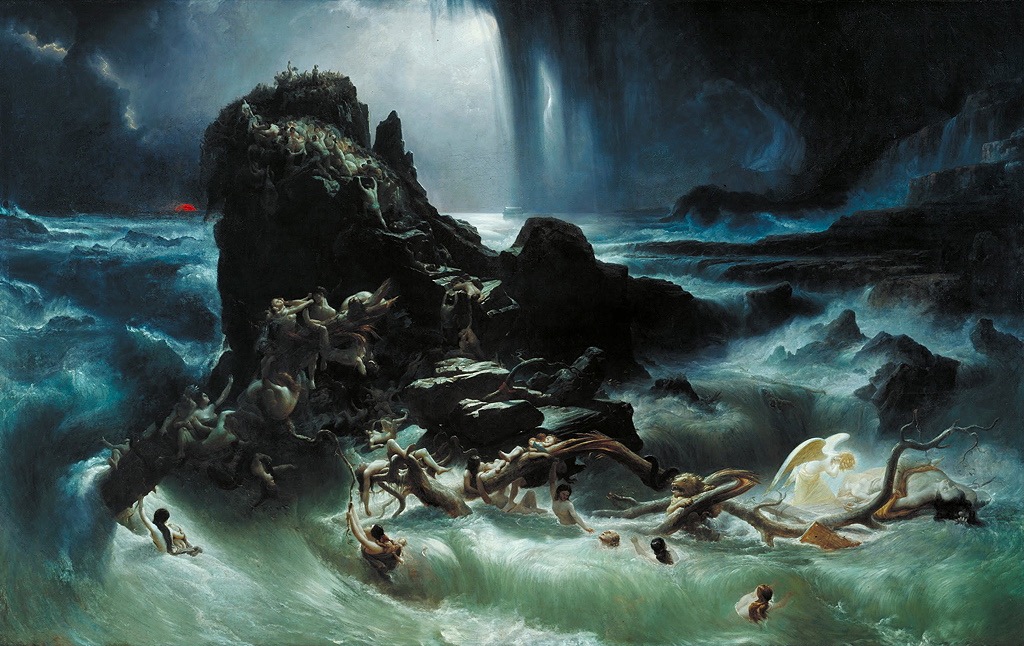
Francis Danby: The Deluge (1840)
" … find good reason to look back longingly …"
We hadn't seen any real rain—really, no rain at all—since we'd returned to The Villa Vatta Schmaltz in late March. We'd seen what might have passed as a passing shower had it done more than briefly dampen the pavement before quickly evaporating off. One hundred and seventy days of extreme drought, also one hundred and seventy days of SettlingInto and HomeMaking, more than half a year. I'm tempted to call that period an era, because it seems as though it was. One rainy day seems to have broken a persistent spell, one during which I could not tell where its edge might lie. Those days seem to have been suspended in time and place, framing our return to this most extraordinary space, like an extended overture setting the stage for whatever follows. It seemed endless from within it, sometimes interminable. During the hottest summer days, we seemed especially cursed, but mostly it seemed as if we had been especially blessed. I knew it could not last but I didn't want it to end then, or ever. It's over now.
Oh, I expect an extended Indian Summer to work on scaffolding, tidying up a few surfaces and windows.
UnderDoing
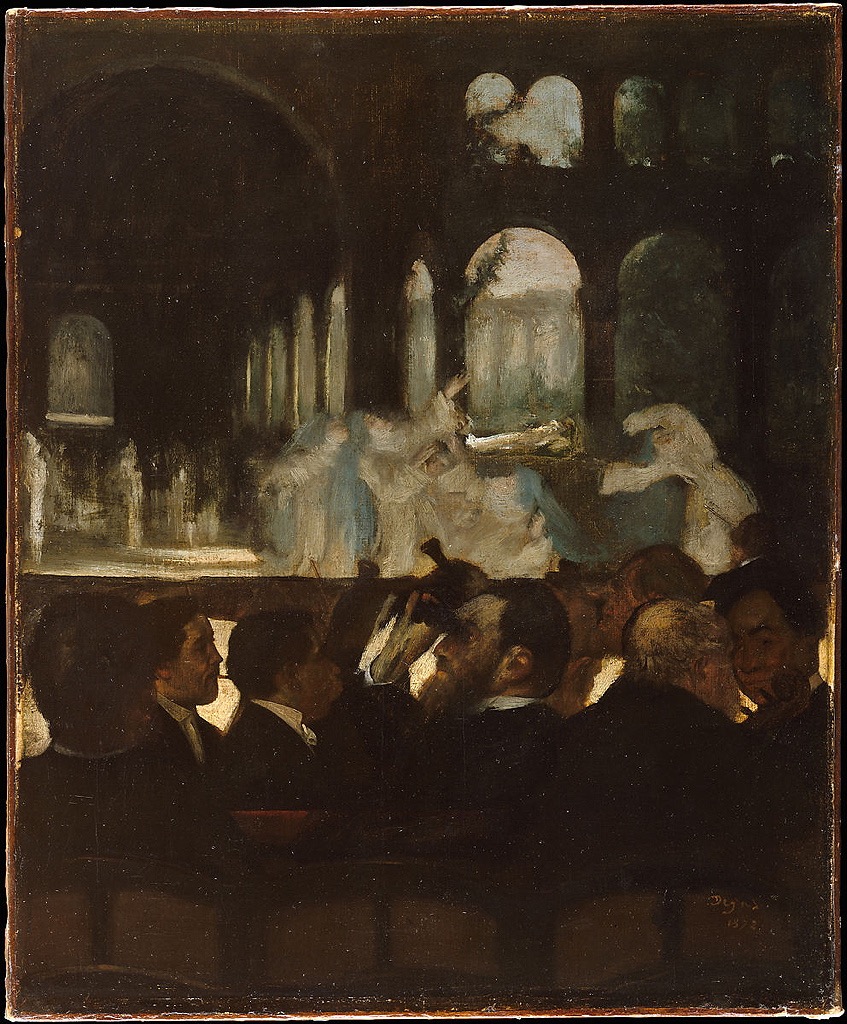
Edgar Degas: The Ballet from "Robert le Diable" (1871)
"I seem to work just to disappoint myself."
We've been working late this week, our little crew usually still here after six most evenings. This might have been a natural reaction to having taken Monday off for the Labor Day holiday, or maybe we sense a major milestone and pivot point approaching. Maybe neither or maybe both. Effect does not require a discrete cause, but seems to beg for one. Our downstairs, main floor work will soon be finished. The planking for the second floor is supposed to be here next week, but has not yet arrived. Joel Our Carpenter reported that he has a few days' fill-in work if our progress stalls. Kurt Our Painter has plenty to keep him occupied, his work necessarily trailing behind. Joel's the finish carpenter, but Kurt actually finishes what Joel just gets started. Kurt says he's used to that.
I wake up at my usual obscenely early hour, but with a difference of late.
Intos
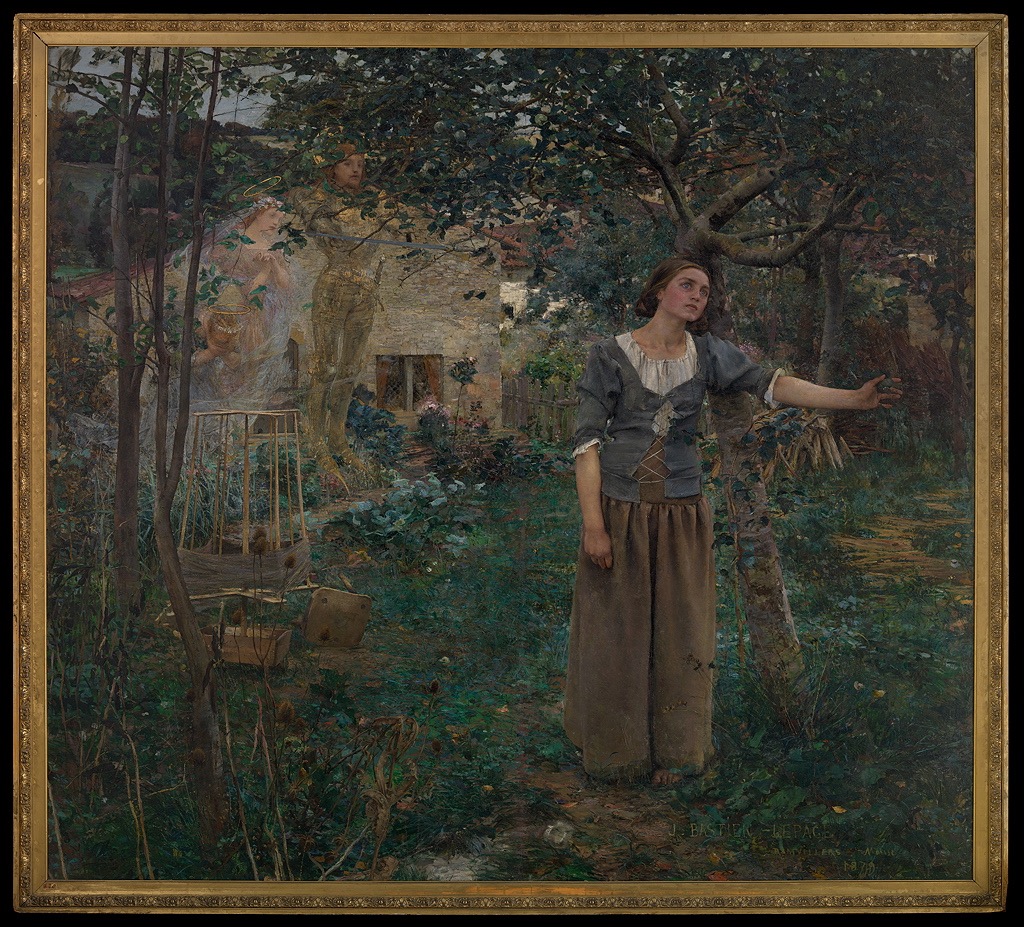
Jules Bastien-Lepage: Joan of Arc (1879)
"I glance up and just notice, then, that I've turned Into someone else."
I feel humbled as our grand refurbish finally starts turning into something more than aspirations. Today marks seven weeks since Kurt Our Painter first appeared here and we began poking around the edges together, working toward a largely undefined center. The Muse and I had just settled on paint color as if that amounted to much, which it did but also did not. Paint color served as the starting point and will become one lasting effect of having done this work, but repainting was not ever the purpose of this refurbish. It served as more of a premise, a story capable of holding many conflicting elements, and in many ways repainting has served as a false premise. Yes, every square inch of much of this house will have been repainted by the time we're finished. Considerable unpainting will have been completed to accomplish finished, too, and more time will have been spent prepping than painting. The labels we give our work materially misrepresent it. Our aspirations still seem vague from today's perspective, so much closer to done than when we started. Much fuzziness remains, though we're not panicking, hoping to become more certain. We seem to have become more comfortable with not precisely knowing and letting results emerge.
The most dramatic results thus far have also been the most subtle, as Intos tend to emerge quietly, without much fanfare.
DustToDust
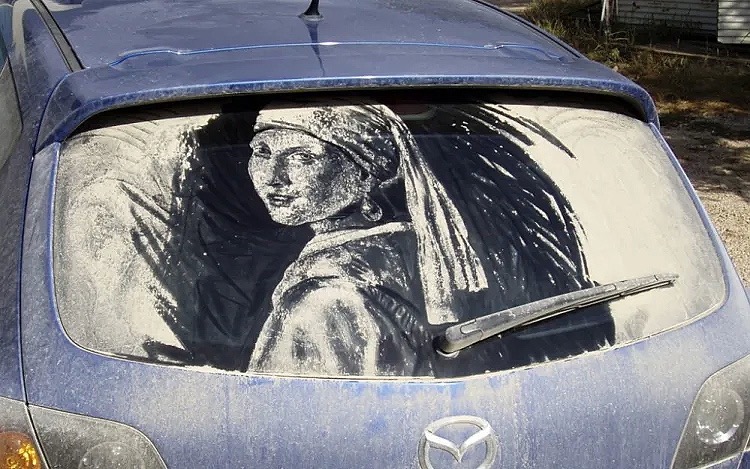
Scott Wade: Girl With A Pearl Earring, the famous Vermeer’s painting, rendered in car window dust (circa 2016)
" … one cannot successfully repaint anyplace while suspended within a blizzard of swirling dust."
Refurbishing remains first and foremost a dusty undertaking. The act of buffing up removes tarnish, which I think of as metastasized dust. Removing carpet, as I've previously mentioned, reveals a layer of fine dust more resembling talcum powder than dirt. Further, the whole house gets covered in a fine fresh layer of the stuff, even the HVAC system and its ducts. Countertops gain a slick surface as if lightly oiled, but that's dust lubricating. Even my body carries a fine layer of it. My fingertips slide over my thumb top as if they were teflon coated. We've sworn to just live with it until the project's finished. There never was any point to trying to keep up. The vacuum fills up until its tank weighs as much as a five pound bag of sugar but the floors and walls remain just as slick with it as they were before we began. We tell ourselves that we'll clean from top to bottom as the last act of this project and that might even happen.
Both The Muse and I grew up in places prone to dust storms.
LongWayHome
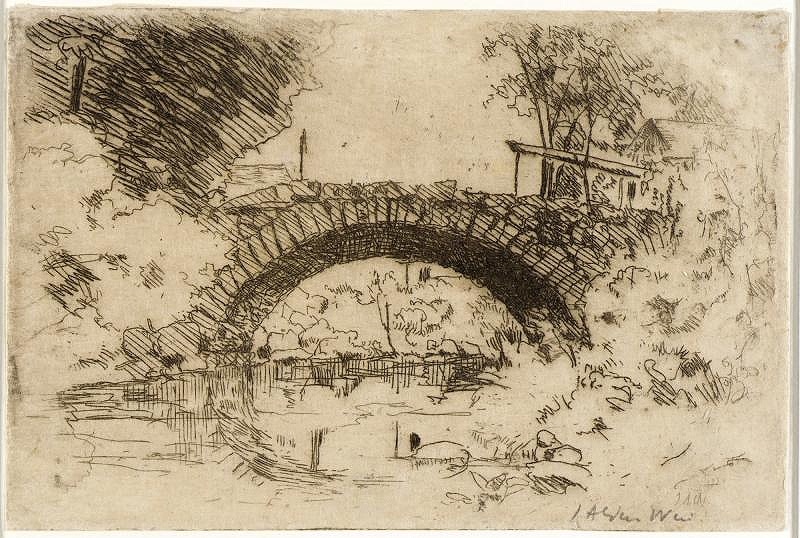
J. Alden Weir: The Stone Bridge (ca. 1887-1893)
"Anything to delay arrival …"
Two hundred and forty-four miles separate these two worlds, the one I was raised in and the one I came of age in. All my life, I've traveled between these two points more than between any two other. Even those years where I commuted weekly to work in Silicon Valley barely dented this enduring trajectory. Even leaving the area, moving back east, and spending years away didn't change how I related to my world. Home came in two flavors. There was home and then there was back home, each authentic, neither sufficient all alone. One home held my stuff, the other, my roots. Neither place made any sense without the other. I suppose that it's this way for anyone who moves away to make their life. One can move out but not permanently away, or at least I never found a way to permanently stay away. I was always headed home, either to where my heart was or to where my stuff resided. The two states rarely coincided, or didn't until The Muse and I decided to move "back" to my hometown and we bought The Villa. Even then, my son and grandkids came to live at precisely the two hundred and forty-four mile marker from our new home, with home taking on a fresh double meaning: where my heart resides and where my progeny lives.
We migrate between these two homes about once a month for now, taking a long weekend to visit family and perhaps a friend. It's a predictable route.
Justing

Gaetano Gandolfi: Allegory of Justice (1760s)
" … present and damned well worth counting."
The word occasionally appears within the normal flow of conversation and to my ear, suspends the show for a moment. Back in the days when I could still eat in restaurants, I might show up at a hostess stand seeking a table, and be greeted with one of the most discouraging words in the language. "Is it just you, then?" No, I'd reply, it's not just me, it's ME in all my glory! "Just" just sounds so disappointed! Sorry to ruin your day. It's just me today.
We each engage as judge and jury over our proceedings, passing judgements over what we encounter.
OffDays
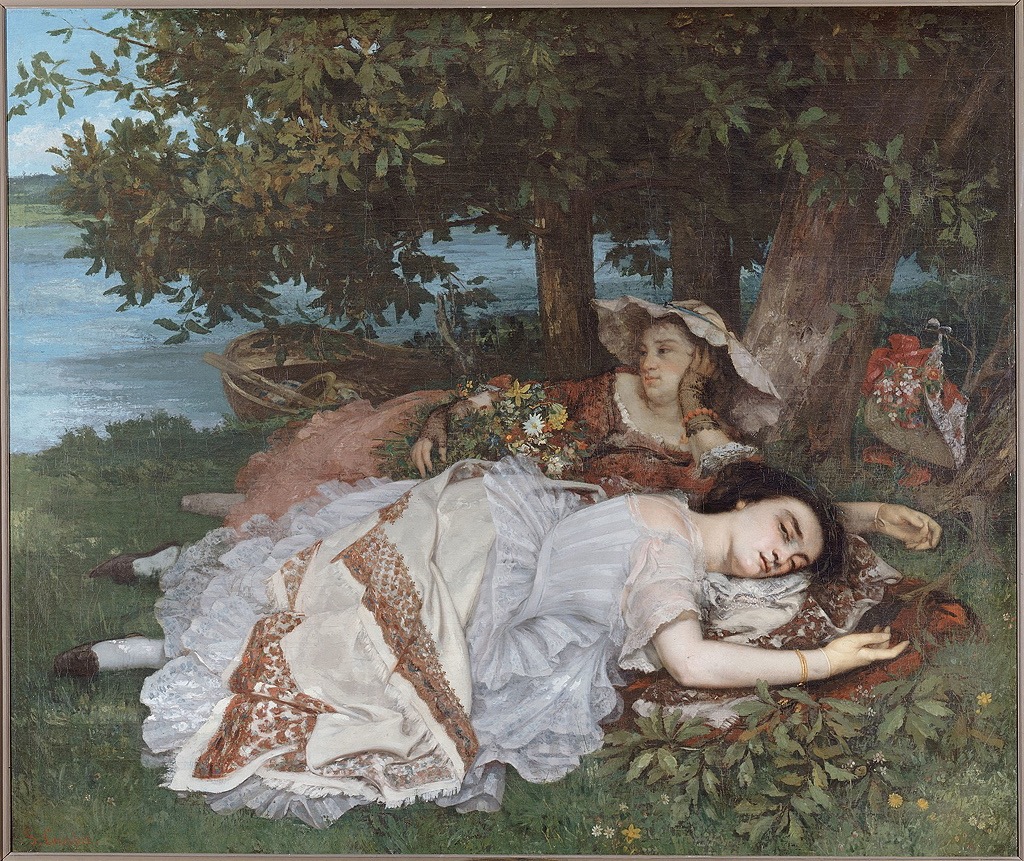
Gustave Courbet: Young Ladies by the River Seine (1857)
"HomeMaking, like breathing, doesn't come with time off for good behavior."
Unlike gainful employment, HomeMaking does not come with days off. It's a twenty-four/seven sort of occupation, with adequate responsibilities to entertain any three individuals for just as many hours as they'd care to contribute. Further, these are not appreciative hours but largely anonymous ones, where if one's properly engaged, no one will notice. Still, occasionally, some respite seems necessary if never wholly justified. Rather than taking a day off, I experience an OffDay. An OffDay begins like any other, though perhaps gravity might work a little better than usual when the alarm clock rings. I'm up and moving, completing my morning rituals, writing. I'll be done about the time The Muse's alarm wakes her. My breakfast will have been warming. I set right to it, shave and shower, then slow down a bit. I might lay down, I tell myself, to digest my breakfast, then doze. An hour later, I still haven't gone anywhere and am still feeling dozy. I allow myself another half hour until those short cycles accumulate into taking the whole morning.
I won't usually allow myself a whole day off when an OffDay comes calling.
UnrelentingDecency

Heinrich Aldegrever: Temperance. From: The Virtues Production (1552)
" … gritting our teeth in utter embarrassment for them."
The Muse returned deeply upset from her Friday Exceptional Women breakfast. She'd heard stories of incivility at the Democrat's Fair Booth. Apparently, Republican-associated rabble had taken the opportunity to unleash venom at their presumably evil opponents there. The Muse was justifiably worried. If some people felt comfortable verbally assaulting without provocation their presumed opposition, how could we possibly avoid a civil war, or an uncivil one? She brought this question to my Friday Zoom Chat, and we mumbled over it.
It's an old question. If the opposition seems unconstrained, should we mirror their lack of discipline in order to win or must we hold ourselves to higher standards?
SandMan

Michael Taylor: Boy with Apple, a faux painting made for the 2014 film The Grand Budapest Hotel.
" … a substance expressly designed to undo the past with an unskilled hand."
As I finished sanding the last baseboard to bare wood, I caught myself having insisted upon the lowliest role again. In the grand pecking order I've constructed within my head, our painter Kurt and our carpenter Joel both hold lofty positions due to the experience and skill they bring to the effort. Even The Muse, who mostly engages in abstentia while working remotely in her Basement Zoom® Lair, holds a loftier position than mine, for she's the designer and vision keeper. She's the one everyone else waits on before they proceed. Me? I'm the guy who semi-reliably removes nails and mostly successfully tries to keep track of doorknobs. I also empty garbage and sand. I've been sanding a lot lately. Once we realized that we'd need to reclaim and alter all the existing door and window trim to satisfy The Muse's vision for them, it became necessary to sand all those boards to bare, to rid them of every trace of a hundred and fifteen years of accumulated past. Five coats for some pieces.
Rather than divert paid assistance toward such a lowly assignment, I volunteered.
TheGrip
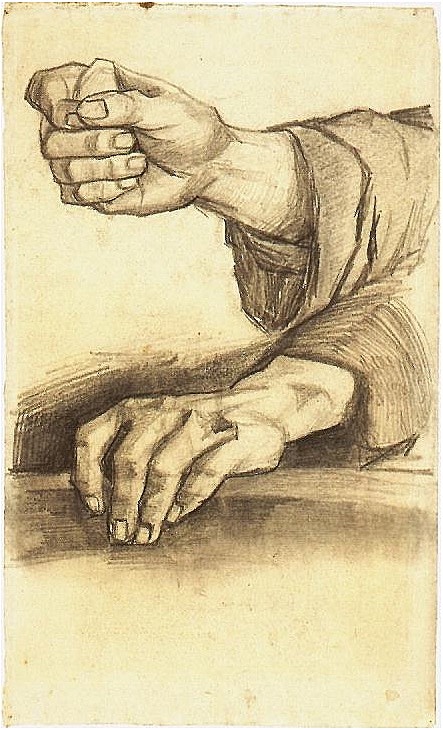
Vincent van Gogh: Two Hands (1884 - 85)
"I must be overreaching or I don't feel as if I'm living at all."
I become a sawyer when I'm sanding a board clean of paint. Sawyers stood in deep ditches and worked their long saws up into logs laid across, their partner sawing down, showering them in sawdust. Each one seven feet in length and smeared with a variety of coats, I challenge myself to clear one in a single pass without turning off the sander or loosening my grip. Forty-five minutes later, I drop a freshly cleaned board onto my padded saw horses and I loosen my grip, TheGrip. My hand lost feeling long ago under the incessant vibration of the humming little machine I held in my palm. I'm liberally covered with fine saw and paint dust the consistency of talcum powder. I sweep off the finished board, a hundred and fifteen years old and fine-grained, looking freshly milled, and add it to the finished pile. I have at least a half dozen more to finish today to avoid holding up forward progress installing window and door trim. I hold a worthy purpose in my life at the moment. I hold it with TheGrip.
It's not every day or every time when worthy purpose visits.
Changeling

Henry Fuseli: Der Wechselbalg (1781)
"She owns her choice …"
Granddaughters have by long tradition been the most troubling of relatives. Grandsons can reliably become meatheads without surprising anybody, but granddaughters seem mercurial, capable of material changes without any warning. Our GrandOther proves no exception. The Muse and I had noticed since we returned from exile that The Other had changed, with less energy focused upon sugar, spice, an everything nice and much more on puppy dog tails and worse. She seemed much more capable of morose and mouthy, often without apparent regard to who her words might wound. She seemed defensively haughty. We figured it might just be evidence of a phase or something. Aren't eleven year olds allowed phases? My duck feathers mostly shed her venom without it wounding me much. About the fiftieth time a granddaughter proclaims that she'd rather be dead than be with me, though, the story gets to feeling old.
And so it was that I agreed to pick her up after the second day of the new school year and transport her to The Villa where she could wait for her dad to get off work and fetch her home.


